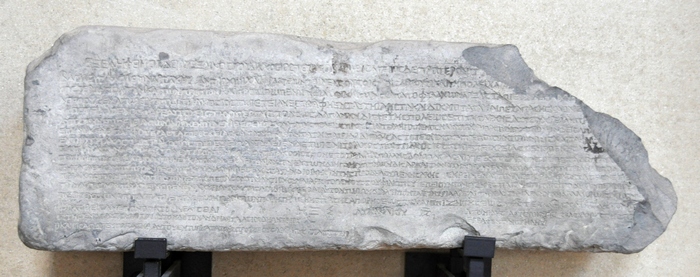Susa, Letter from Artabanus II

Description | Susa, Letter from Artabanus II, requesting the appointment of one Hecataeus as treasurer |
Details |
Received in the 268th year according to the king's calendarnote and in the 333rd year according to the former calendar. King of kings Arsaces to Antiochus and Phraates the two archons in Susa and to the city, greeting. [Since Hestiaeus the son of Asius], one of your citizens and a member of the order of "the first and chief-honored friends" and of "the bodyguards," conducted himself in the office of treasurer in the year ([according to the former] numbering) 329note most honorably and justly and with all incorruptibility, shrinking from [no expense] of his own when the outlay was for the good of the city; twice during his term of office when the city [had] need of an envoy [he made the journey] himself, thinking the care of his own property unimportant but the city's affairs more urgent, and sparing neither money nor trouble he devoted [himself without reserve] to the two embassies, and having managed them to the city's advantage he received the appropriate honors, as the decree voted [by the city] in the year 330 testifies; since in the year 331 when need arose of a good [man he was again nominated] for the same office for the year 332, and after a long examination (when Petasus the son of A[ntiochus had been elected archon with Aristomenes] the son of Philip) he came forward and deposed that he was debarred by the constitution (?) from filling the same office a second time before the lapse of three years; since the city, [knowing from experience] his good character and remembering his administration of the same office, decided to choose him treasurer, and so he was elected [for the] year 332 in the archonship of Petasus the son of Antiochus and Aristomenes the son of Philip; since then [you have reported] Hestiaeus [to us] on the above grounds, we decide that his election was valid and that he is not to be prosecuted for having filled the same office twice without allowing an interval of three years to elapse, nor on the basis of any other royal order dealing with the subject whatsoever, and we decide in general that the [illegality which] has been pointed out be expressly forgiven, no denial or investigation either general or specific being required (?). Year 268, Audanaios 17th. (translation: C.B. Welles) |
Date | 25/26 CE |
Inscriptionnr | IK Estremo oriente 218 (Greek) |
Creator | |
Museum | |
Licence | |
Linked | |
Categories | |
Tags |
We share high-resolution versions of our original photographs. Contact us for further information and be sure to make a note of the URL of the photos you are interested in.